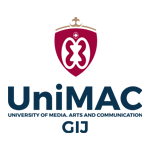Overview
Studying at UniMAC-GIJ offers numerous advantages. The school attracts lecturers and speakers who are experts in their fields as well as students who already professionals. As a result, our students gain invaluable opportunities to learn from peers and practitioners.
UniMAC-GIJ has two campuses; one located at Ringway, Osu, and the other at North Dzorwulu, all in Accra.
Our History
UniMAC-GIJ, formerly the Ghana Institute of Journalism, was officially opened on Monday, 16th October, 1959, by the then Minister of Information and Broadcasting, Mr. Kofi Baako.
The school was established by the Kwame Nkrumah government to provide training in journalism toward the development of a patriotic cadre of journalists to play an active role in the emancipation of the African continent.
Initially a department of the Accra Technical Institute (now Accra Technical University), the school had as its first principal and journalism tutor, Mr Richard McMillan, then retiring as Director of British Information Services in Ghana. In 1966, the school moved to the present site which used to house the Ghana Press Club.
Over the years, the Institute has undergone significant changes and owes its current tertiary status to the following legislative instruments.
1974 Decree Establishing GIJ
In 1974, the National Redemption Council (NRC) passed a legislative instrument (NRCD 275) formally establishing the Ghana Institute of Journalism. The decree set as objects of the Institute the following:
To train young men and women in the skills and techniques of journalism, mass communication, advertising and public relations.
To organise classes, lectures, seminars, demonstrations, experiments, researches and practical training in all aspects of journalism and mass communication.
For several decades these objectives served as the Institute’s core functions in training and awarding diplomas and certificates in communication studies.
2006 Act Elevating GIJ to Tertiary Status
The Parliament of the Fourth Republic and the President enacted the Ghana Institute of Journalism Act, 2006 (Act 717) to transform the Institute into a degree-awarding tertiary institution.
Subsequently, the President granted a Charter to enable the Institute award its own degrees, diplomas and certificates for programmes accredited by the National Accreditation Board. This certificate was assented to by the President in August 2006, with a Gazette notification on 1st September 2006.
UNIVERSITY OF MEDIA, ARTS AND COMMUNICATION (UniMAC)
The University of Media, Arts and Communication (UniMAC) was established by the University of Media, Arts and Communication Act, Act 1059 of 2020. This merged the Ghana Institute of Journalism, established in 1959, the National Film and Television Institute, established in 1978 and the Ghana Institute of Languages, established in 1961, into one public university.
The enactment was a bold step to fulfill a long-standing desire and advocacy by the constituent institutes to merge into a full-fledged university and improve on their extremely intertwined offerings to their students and academia.
The Act established the University as a holding university for autonomous institutes with a core mandate to provide higher education, disseminate knowledge related to the development of the media, arts and communication industry in the country, undertake research and foster relationships with persons outside the University through the following Institutes:
i. An Institute of Journalism
ii. An Institute of Film and Television
iii. An Institute of Languages
iv. An Institute of Theatre and Performing Arts
v. An Institute of Institute of Digital Media Arts
vi. Any other Institute, School or Centre the Council may determine.
Interim Governing Council
The Minister of Education in June 2020, inaugurated the following as
Members of the Interim Council for the University of Media, Arts and
Communication:
i. Prof. Kwesi Yankah – Chairman
ii. Dr. G. Koryoe Anim-Wright – Member
iii. Mad. Angela A. Asare Affran – Member
iv. Prof. George Kankam – Member
v. Mr. K.A. Karikari – Member
vi. Mr. Francis Obeng – Member
vii. Dr. Mrs. Evelyn Owusu Oduro – Member
The Interim Council, tasked with the duty to see to the operationalization of the University, in December 2022 appointed the underlisted as Management of the University:
Management Team
i. Prof. Kwamena Kwansah-Aidoo – Ag. Vice-Chancellor
ii. Dr. Janetta Sika Akoto – Ag. Registrar
iii. Mr. Francis Obeng – Ag. Finance Director
iv. Prof. Eric Opoku Mensah – Ag. Rector, UniMAC GIJ
v. Dr. Samuel A. Nai – Rector, UniMAC NAFTI
vi. Dr. Sampson Dodzi Fenuku – Ag. Rector, UniMAC GIL
University Logo
The Management Team in consultation with the Interim Governing Council on 19th December 2022 unveiled the University Logo to replace logos of the three constituent institutions.
The logo is tricoloured; burgundy which connotes passion, excitement, and confidence; mustard brown, representing reliability, support, and authenticity and prussian blue which stands for trust, relevance and authority. It contains three distinct Adinkra symbols to demonstrate African values
and culture. The “Nkonsonkonson” is a symbol of unity and human relations, the “Dame-Dame” signifies intelligence and integrity and the “Akok) nan” represents nurturing/training and discipline.
